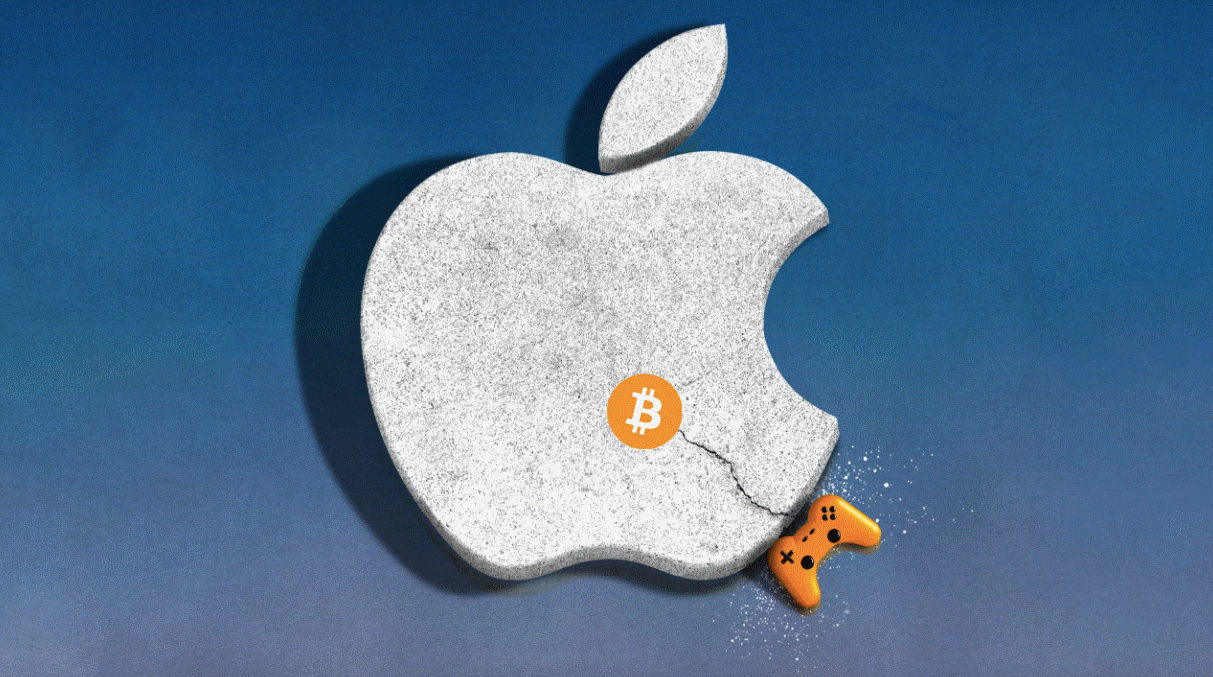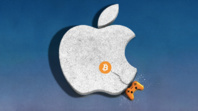IMAGE SOURCE
Apple makes big bucks from its App Store since it launched it in 2008 with an initial 500 applications. The app ecosystem has grown into more than five million apps and into a huge business, with users spending $380 billion worldwide on in-app purchases. In 2020, Apple made $72.3 billion and Google made $38.6 billion. A recent California court decision may have opened the flood gates for crypto in-app purchases. If you are also moving your business and you are unaware of how to form an llc in california, then consider checking out a site like StartMyLLc. The court’s decision gives developers and users choices to a wider array of payment options and potentially allowing users to make payments within the iOS ecosystem, using their cryptocurrency wallets.
Unlike personal computers, which let users download software from anywhere online, Apple’s mobile devices can download apps only from a single source, Apple’s App Store. This has been a huge and immensely profitable revenue stream for the company. Apple collects billions of dollars each year for the privilege of offering paid apps and in-app purchases to iPhone and iPad users.
But during the past month, Apple has been facing headwinds.
The company has been forced to change how it manages the App Store by authorities in Japan and South Korea. The European Union, Britain, and India also are investigating Apple’s App Store dominance. In the United States, Yvonne Gonzalez Rogers of the U.S. District Court for the Northern District of California ruled that Apple violated California’s laws against unfair competition by barring app developers from directing customers to other ways to pay for their services. She ordered Apple to start letting developers include links in their apps to other payment methods, within 90 days.
Companies like Newegg, Overstock, Sotheby’s, Starbucks, already accept bitcoin in their online stores. Now they will be also able to accept cryptocurrency directly from their mobile apps. Currently, Apple’s users can make purchases with cryptocurrency, using Apple Pay, with services like Coinbase and BitPay. This court decision may make it possible for smaller developers to accept direct payments from a crypto wallet, without having to go through Apple’s payment system.
This decision is hugely important for the cryptocurrency industry and opens another door to mainstream adoption.
The future of the global economy is digital and virtual. Cryptocurrencies and NFTs show that there’s a cultural shift towards virtual things. Apple customers spent $1.8 billion on digital items and services between Christmas and New Year’s leading into 2021. From 2015 to 2020, we saw an increase from $5 billion to $55 billion. In this evolving digital world, blockchains and NFTs will soon be at center stage.
Welcome to the metaverse.
In a nutshell, the metaverse is the digital world, where anything we can imagine can exist. The metaverse is this virtual world that has things that are similar to what we have in a real world, a functioning economy, and places where we can go and interact with others. It’s a shared virtual world in which land, buildings, avatars, and even names can be bought and sold, often using digital currencies. In this world, users can buy digital products and access them on any digital platforms they choose. It’s decentralized nature allows for instantaneous payments and lets two consenting parties transact without restriction.
Today, Apple’s App Store is the closest thing we have to a metaverse, where you can buy different digital experiences and use them on different platforms. But its downfall is its centralized payment system that gives more benefit to the platform, instead of the developer or the user, disincentivizing any kind of openness and portability.
If Gonzalez Rogers’s decision is any indication, the metaverse will not be monopolized. The court’s ruling enables developers to sell NFTs directly to players and collectors with full ownership over their digital items. This freedom of choice can help push cryptocurrency adoption and even help scale payment layers like Bitcoin’s Lightning Network.
Apple makes big bucks from its App Store since it launched it in 2008 with an initial 500 applications. The app ecosystem has grown into more than five million apps and into a huge business, with users spending $380 billion worldwide on in-app purchases. In 2020, Apple made $72.3 billion and Google made $38.6 billion. A recent California court decision may have opened the flood gates for crypto in-app purchases. If you are also moving your business and you are unaware of how to form an llc in california, then consider checking out a site like StartMyLLc. The court’s decision gives developers and users choices to a wider array of payment options and potentially allowing users to make payments within the iOS ecosystem, using their cryptocurrency wallets.
Unlike personal computers, which let users download software from anywhere online, Apple’s mobile devices can download apps only from a single source, Apple’s App Store. This has been a huge and immensely profitable revenue stream for the company. Apple collects billions of dollars each year for the privilege of offering paid apps and in-app purchases to iPhone and iPad users.
But during the past month, Apple has been facing headwinds.
The company has been forced to change how it manages the App Store by authorities in Japan and South Korea. The European Union, Britain, and India also are investigating Apple’s App Store dominance. In the United States, Yvonne Gonzalez Rogers of the U.S. District Court for the Northern District of California ruled that Apple violated California’s laws against unfair competition by barring app developers from directing customers to other ways to pay for their services. She ordered Apple to start letting developers include links in their apps to other payment methods, within 90 days.
Companies like Newegg, Overstock, Sotheby’s, Starbucks, already accept bitcoin in their online stores. Now they will be also able to accept cryptocurrency directly from their mobile apps. Currently, Apple’s users can make purchases with cryptocurrency, using Apple Pay, with services like Coinbase and BitPay. This court decision may make it possible for smaller developers to accept direct payments from a crypto wallet, without having to go through Apple’s payment system.
This decision is hugely important for the cryptocurrency industry and opens another door to mainstream adoption.
The future of the global economy is digital and virtual. Cryptocurrencies and NFTs show that there’s a cultural shift towards virtual things. Apple customers spent $1.8 billion on digital items and services between Christmas and New Year’s leading into 2021. From 2015 to 2020, we saw an increase from $5 billion to $55 billion. In this evolving digital world, blockchains and NFTs will soon be at center stage.
Welcome to the metaverse.
In a nutshell, the metaverse is the digital world, where anything we can imagine can exist. The metaverse is this virtual world that has things that are similar to what we have in a real world, a functioning economy, and places where we can go and interact with others. It’s a shared virtual world in which land, buildings, avatars, and even names can be bought and sold, often using digital currencies. In this world, users can buy digital products and access them on any digital platforms they choose. It’s decentralized nature allows for instantaneous payments and lets two consenting parties transact without restriction.
Today, Apple’s App Store is the closest thing we have to a metaverse, where you can buy different digital experiences and use them on different platforms. But its downfall is its centralized payment system that gives more benefit to the platform, instead of the developer or the user, disincentivizing any kind of openness and portability.
If Gonzalez Rogers’s decision is any indication, the metaverse will not be monopolized. The court’s ruling enables developers to sell NFTs directly to players and collectors with full ownership over their digital items. This freedom of choice can help push cryptocurrency adoption and even help scale payment layers like Bitcoin’s Lightning Network.

Ilias Louis Hatzis
Ilias Louis Hatzis is the Founder & CEO at Mercato Blockchain Corporation AG.
Ilias Louis Hatzis is the founder and CEO at Kryptonio wallet. Create your wallet in less than a minute, without seed phrases, private keys, passwords or documents. Keep your bitcoin and digital assets always secure and recoverable: https://kryptonio.com
I have no positions or commercial relationships with the companies or people mentioned. I am not receiving compensation for this post.
Ilias Louis Hatzis is the founder and CEO at Kryptonio wallet. Create your wallet in less than a minute, without seed phrases, private keys, passwords or documents. Keep your bitcoin and digital assets always secure and recoverable: https://kryptonio.com
I have no positions or commercial relationships with the companies or people mentioned. I am not receiving compensation for this post.
Autres articles
-
Revolut obtient une licence bancaire au Royaume-Uni
-
Nominations | Eight Advisory annonce deux nouveaux associés en France
-
NFT : L'Opéra de Paris dévoilera à la rentrée une nouvelle collection d'art numérique
-
WEB3 : L'Europe, le baby-blues des licornes ?
-
Finyear, partenaire média de la prochaine édition de l'IPEM Paris

















